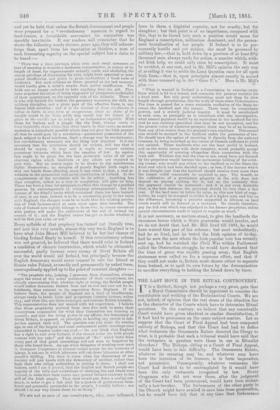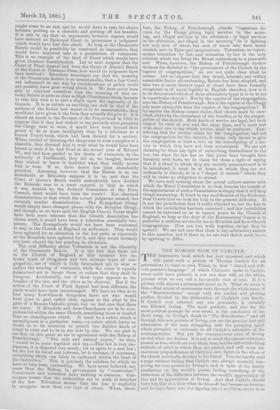THE LAST MOVE IN' THE RITUAL CONTROVERSY.
TT is a distinct, though not perhaps a very great, gain that a Royal Commission should be appointed to consider the constitution and working of the Ecclesiastical Courts. We are not, indeed, of opinion that the real stress of the situation lies in the character of the Courts which have to determine Ritual questions. On the contrary, we believe that any conceivable Court would have given identical or similar dissatisfaction, if it had had to pronounce on the same subject-matter. Let us suppose that the Court of Final Appeal had been composed entirely of Bishops, and that this Court had had to define what vestments the Ornaments Rubric directed the Clergy to wear, is it probable that such a tribunal would have said that the vestments in question were those in use in Ritualist churches ? The Bishops, sitting as a Court of Final Appeal, would, have been in this difficulty. The Ornaments Rubric, whatever its meaning may he, and whatever may have been the intention of its framers, is in form imperative, not permissive. Consequently, whatever vestments the Court had decided to be contemplated by it would have been the only vestments recognised by law. Every clergyman who did not wear them, after the judgment of the Court had been pronounced, would have been techni- cally a law-breaker. The forbearance of the other party in the Church might have availed to save him from prosecution, but he would have felt that at any time that forbearance
might come to an end, and he would have to take his choice between putting on a chasuble and putting off his benefice. It is safe to say that no arguments, however cogent, would have induced an Episcopal Court to pronounce a judgment which would have had this result. So long as the Ornaments Rubric could by possibility be construed as imperative, they would have imported into it a prohibition of vestments. This is an example of the kind of Court which would have given identical dissatisfaction. Let us next suppose that the Court of Final Appeal had been the Court of Queen's Bench or the Court of Common Pleas, how would its judgment have been received ? Ritualists sometimes say that the meaning of the Ornaments Rubric is so unmistakable, that a Lay Court not influenced in any way by considerations of policy could not possibly have gone wrong about it. We have never been able to convince ourselves that the meaning of this un- lucky Rubric is quite so clear as High Churchmen think, because to take this view is to east a slight upon the ingenuity of its framers. It is as certain as anything can well be that if the authors of the Rubric had meant it to be unmistakable, they would not have given it the form they actually did give it. It is almost an insult to the Revisers of the Prayer-book in 1662 to suppose that if they had wished to say precisely what garments the Clergy were to wear, it would have been beyond their power to do so more intelligibly than by a reference to a former Prayer-book, which had been disused for a century. When, instead of directing the clergyman to wear a surplice or a chasuble, they directed him to wear what he would have been bound to wear if he had lived in the second year of Edward VI., and had been guided in his choice of vestments by the authority of Parliament, they did so, we imagine, because they wished to leave it doubtful what they really meant him to wear. If so, their desire has been abundantly gratified. Assuming, however, that the Rubric is as un- mistakable as Ritualists suppose it to be, and that the Court of Queen's Bench would undoubtedly have decided the Ridsdale case in a sense opposed to that in which it was decided by the Judicial Committee of the Privy Council, what would have been the result ? Not identical dissatisfaction to that which the actual judgment created, but certainly similar dissatisfaction. The Evangelical Clergy would simply have changed places with the Ritualist Clergy, and though, as we have said, the English Chui ell Union might have been more tolerant than the Church Association has shown itself, it would have been a toleration essentially tem- porary. The Evangelicals would not have been contented to stay in the Church of England on sufferance. They would have agitated for an alteration in the law quite as vigorously as the Ritualists have agitated for it, and they would certainly not have obeyed the law pending its alteration.
The real difficulty about Vestments is not the obscurity of the Ornaments Rubric. It is the fact that there are in the Church of England at this moment two ex- treme types of clergymen and two extreme types of con- gregation, one of which is fully determined not to wear or endure the wearing of vestments, while the other is equally determined not to forego them, or endure that they shall be foregone. Accidentally, one of these types appears as the breaker of the law, and the other as its observer. But if the action of the Court of Final Appeal had been different, the parts would have been interchanged. We have no idea as to how many Low-Church clergymen there are who would have gone to gaol rather than appear at the altar in the garb of a Roman Catholic priest, but we feel sure that there are many. If Ritualists and Low-Churchmen are to be com- prehended within the same Church, something more is wanted than an unambiguous rubric, It must be a rubric which is unambiguous in a particular sense,—a rubric which leaves no doubt as to its intention to permit two distinct kinds of ritual to exist and to be in use side by side. We are glad to see that on this point we are in agreement with the Bishop of Peterborough. "The only and natural course," he says, "would be to come together and say,—This law is very am- biguous, it is disputed very much ; let us agree to a new law ; let the law be broad and tolerant, let it embrace, if necessary, everything which can fairly be embraced within the limit of the institution." This is precisely the solution for which we have so long been contending. We have never believed, any more than the Bishop, in government by "connivance." Connivance and toleration have nothing in common. Con- nivance means that the authorities are to wink at breaches of the law. Toleration means that the law is explicitly to recognise more than one type of ritual. When, there- fore, the Bishop of Peterborough attacks "ingenious de- vices for the Clergy giving legal services in the morn- ing, and illegal services in the afternoon ; or legal services in the afternoon, and illegal in the morning," he is fighting not only men of straw, but men of straw who have never existed, save in Episcopal imaginations. Toleration, we repeat, means toleration by law, and toleration by law is the only solution which can bring the Ritual controversy to a peaceable end. When, however, the Bishop of Peterborough further declares his disbelief in "the government of the Church by the caprice of congregations," we are not quite clear what he means. Let us suppose that this broad, tolerant, and within reasonable limits all-embracing, Rubric has been adopted, and that two or more distinct types of ritual have been formally recognised as of equal legality in English churches, how is it to be determined which of these alternative types is to be in use in a particular church ? Not by the caprice of the congregation, says the Bishop of Peterborough. But is the caprice of the Clergy any more admirable than the caprice of the congregation ? If by caprice the Bishop means choice, that choice must be exer- cised, either by the incumbent of the benefice, or by the congre- gation of the church. Both kinds of service are legal, but both cannot be used at one and the same time, and it must rest with some one to say which service shall be preferred. Con- sidering that the service exists for the congregation, and not the congregation for the service, it seems only decent to give the congregation at least a veto on the introduction of a ser- vice to which they have not been accustomed. We are not claiming for them any right of authorising disobedience to the law, but when the law has on this point been brought into harmony with facts, we do claim for them a right of saying that if a ritual to which they are entirely unaccustomed is to be introduced, it must be at hours at which they are not ordinarily in church, or in a "chapel of retreat" which they will be under no obligation to attend. We have said nothing about the actual subject-matter with which the Royal Commission is to deal, because the benefit of the appointment of such a Commission is simply that it will keep things simmering. It is not to any modification of the Ecclesias- tical Courts that we look for help in the present difficulty. It is not the jurisdiction that is really objected to, but the way in which the jurisdiction has been exercised ; and this jurisdiction cannot be exercised so as to ensure peace in the Church of England, so long as the duty of the Ecclesiastical Courts is to prescribe a uniform service for use in Ritualist and Low-Church congregations. How can two walk together, except they be agreed ? We are not sure that there is any satisfactory answer to this question, but if there is, we are sure that it must be,— by agreeing to differ.



































 Previous page
Previous page